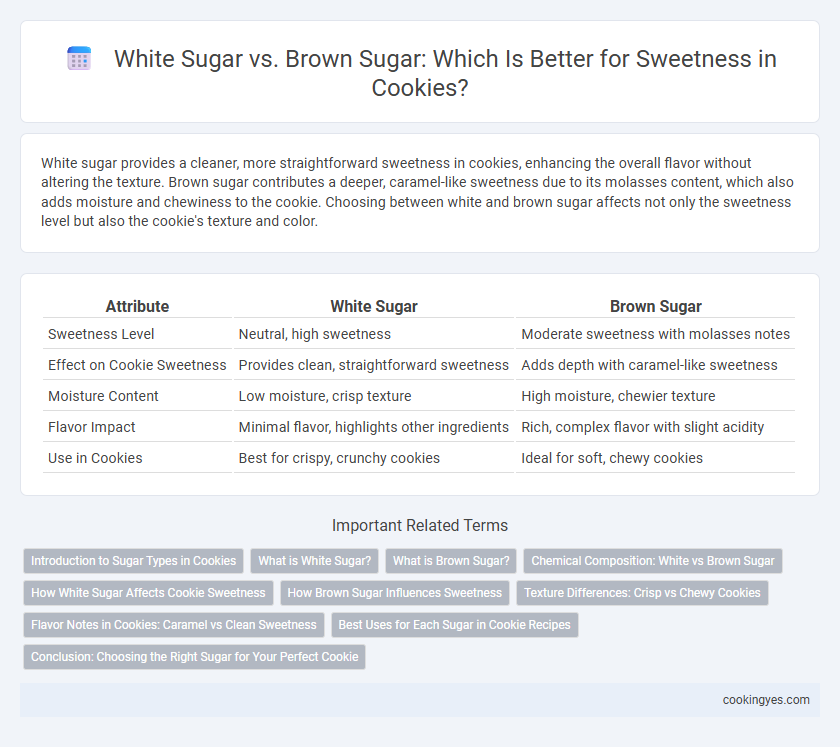White sugar provides a cleaner, more straightforward sweetness in cookies, enhancing the overall flavor without altering the texture. Brown sugar contributes a deeper, caramel-like sweetness due to its molasses content, which also adds moisture and chewiness to the cookie. Choosing between white and brown sugar affects not only the sweetness level but also the cookie's texture and color.
Table of Comparison
| Attribute | White Sugar | Brown Sugar |
|---|---|---|
| Sweetness Level | Neutral, high sweetness | Moderate sweetness with molasses notes |
| Effect on Cookie Sweetness | Provides clean, straightforward sweetness | Adds depth with caramel-like sweetness |
| Moisture Content | Low moisture, crisp texture | High moisture, chewier texture |
| Flavor Impact | Minimal flavor, highlights other ingredients | Rich, complex flavor with slight acidity |
| Use in Cookies | Best for crispy, crunchy cookies | Ideal for soft, chewy cookies |
Introduction to Sugar Types in Cookies
White sugar and brown sugar both play essential roles in cookie baking, each imparting distinct sweetness levels and textures. White sugar provides a clean, straightforward sweetness and contributes to crispiness, while brown sugar contains molasses, offering a richer, more complex flavor with added moisture for chewier cookies. Understanding the differences between these sugar types allows bakers to tailor sweetness and texture according to cookie preferences.
What is White Sugar?
White sugar, also known as granulated sugar, is a highly refined sweetener made from sugar cane or sugar beets, primarily composed of sucrose crystals with no molasses content. It provides a clean, pure sweetness that dissolves quickly, contributing to a crisp texture in cookies and allowing other flavors to shine. Unlike brown sugar, white sugar does not add moisture or caramel notes, resulting in lighter, more evenly baked cookie edges.
What is Brown Sugar?
Brown sugar is a moist, granulated sugar containing molasses, which gives it a richer flavor and darker color compared to white sugar. Its higher moisture content adds chewiness and a deeper caramel-like sweetness to cookies, enhancing texture and taste. Using brown sugar in cookie recipes often results in softer, more flavorful baked goods with a hint of molasses complexity.
Chemical Composition: White vs Brown Sugar
White sugar primarily consists of sucrose crystals, providing pure sweetness with minimal moisture, while brown sugar contains molasses, which introduces water content and trace minerals like calcium, potassium, and iron. The molasses in brown sugar contributes to a higher moisture level and acidity, affecting the chemical reactions during baking, such as caramelization and Maillard browning. This difference in chemical composition impacts the texture, flavor, and color of cookies, making brown sugar yield softer, chewier cookies with a richer taste.
How White Sugar Affects Cookie Sweetness
White sugar primarily contributes a clean, straightforward sweetness to cookies, enhancing their overall flavor without altering color or texture significantly. It promotes crisp edges and a tender crumb by encouraging caramelization and browning through the Maillard reaction. The high sucrose content in white sugar intensifies sweetness while maintaining a lighter cookie appearance compared to brown sugar.
How Brown Sugar Influences Sweetness
Brown sugar contains molasses, which adds moisture and a rich, caramel-like sweetness to cookies, making them taste deeper and less sharp compared to the straightforward sweetness of white sugar. The presence of molasses also contributes to a chewier texture and enhances the overall flavor complexity. Using brown sugar in cookie recipes results in a richer, more nuanced sweetness that can balance other ingredients.
Texture Differences: Crisp vs Chewy Cookies
White sugar creates cookies with a crisp texture due to its ability to dissolve quickly and encourage spreading during baking. Brown sugar contains molasses, which adds moisture and results in chewier cookies with a denser texture. The choice between white and brown sugar significantly affects the final cookie texture, making white sugar ideal for crunchiness and brown sugar perfect for softness.
Flavor Notes in Cookies: Caramel vs Clean Sweetness
Brown sugar imparts rich caramel flavor notes to cookies, enhancing moisture and providing a deeper, more complex sweetness. White sugar, in contrast, contributes a clean, straightforward sweetness that allows other flavors in the cookie to shine. Choosing between brown and white sugar directly impacts the cookie's overall taste profile, balancing caramel undertones with pure sugary clarity.
Best Uses for Each Sugar in Cookie Recipes
White sugar creates a crisp texture and enhances the sweetness of cookies without adding moisture, making it ideal for recipes like sugar cookies or snickerdoodles where a crunchy bite is desired. Brown sugar, with its higher molasses content, imparts a rich, caramel flavor and moist texture, perfect for chewy cookies such as chocolate chip or gingerbread. Bakers select white sugar to achieve a light, crisp finish, while brown sugar best suits recipes requiring a soft, dense crumb and deeper flavor.
Conclusion: Choosing the Right Sugar for Your Perfect Cookie
White sugar provides a cleaner, crisper sweetness that enhances the cookie's texture and spread, while brown sugar adds moisture, a rich caramel flavor, and a softer, chewier texture due to its molasses content. For a lighter, crunchier cookie, white sugar is ideal, whereas brown sugar is preferred for deeper flavor and a tender bite. Selecting the right sugar depends on the desired cookie texture and flavor profile, balancing sweetness with moisture and chewiness.
White sugar vs Brown sugar for sweetness in cookies Infographic

 cookingyes.com
cookingyes.com